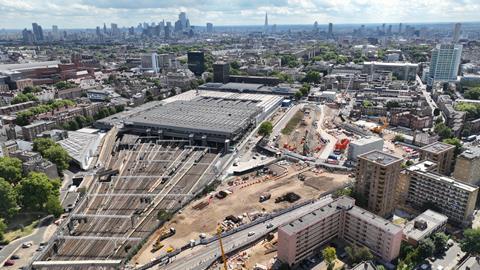Consultants adds schemes need to be better planned to overcome skills gap
Delays to major infrastructure projects could push tender price inflation down next year, according to Turner & Townsend.
The consultant has stuck to its previous 5.5% prediction for infrastructure tender price inflation this year but has revised its 2024 estimate downwards to 4.5%.
Lower private investment than pre-pandemic and the “recent resequencing of major projects” by the government were cited as the reasons of the cooling.

In March, the transport secretary confirmed that the construction of the stretch of HS2 between Birmingham and Crewe would be delayed by two years, with the Euston station project also mothballed for a similar amount of time.
While T&T forecasts a cooling in infrastructure price growth, its predictions for real estate tender price inflation have been revised upwards to 3.7% for 2023 and 2.7% for next year.
Martin Sudweeks, the firm’s UK managing director of cost management, said: “Construction is continuing to feel the aftershocks of the pandemic and global inflationary pressures but the current outlook goes beyond that – and government and industry need to face up to the structural problems our sector is facing.
“The UK wants higher growth, and a greener, more productive economy,” he said.
“But it will remain hard to achieve while we face underinvestment in skills and capacity, and a lack of clarity on a future pipeline of committed projects.”
T&T’s report called for stronger project controls and upfront programme planning to combat a sector-wide capacity crunch, driven in part by growing insolvency rates.
The total number of construction insolvencies rose by 9.7% in the year to Q1 2023, with falling construction output combining with increased input costs to tighten contractor margins.
This downward trend in output is expected to continue through the rest of the year, with a predicted 6.4% fall in part due to declining new housing starts in both the private and public sectors.
“For firms in the eye of the storm, putting the right procurement and digital strategies in place will be essential to mitigating the risks,” said Sudweeks.
“Skills gaps must be identified early, and the availability of key personnel locked in.
“Contractors’ financial status must be rigorously evaluated, along with better management of data and real-time reporting to continually assess the progress and performance of projects.”




























No comments yet